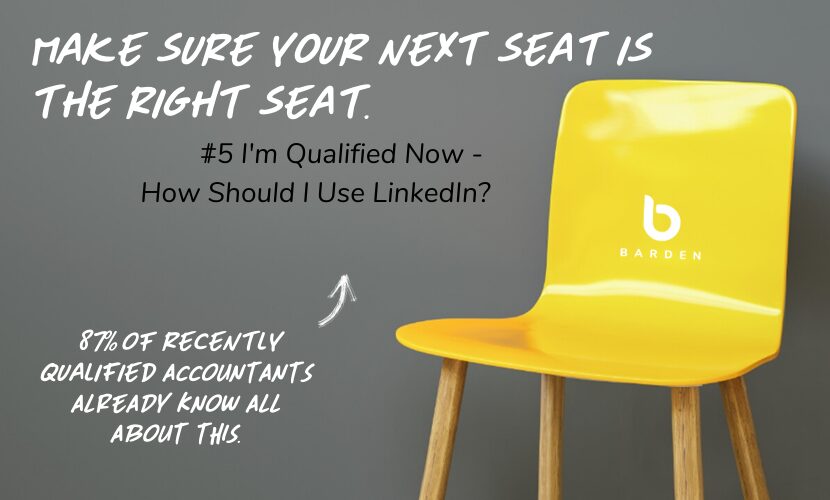There’s no getting away from it. If you haven’t already, it’s time to embrace, build and promote your online presence. As a newly qualified accountant, your LinkedIn profile is your online personal brand and should be thought of as a tool to catch the eye of in-house recruiters, agency recruiters and hiring managers alike.
Having a great LinkedIn profile is not just important for when you are looking for a job – it is a way to stay connected with your intake, participate in your professional community, build your own “hiring manager” brand for the future and a host of other things, not the least of which is giving you the opportunity to be discovered for that ideal role.
Not sure where to start? Our expert team here in Barden have compiled some tips:
#1 It only takes 30 seconds for a recruiter to scan your LinkedIn profile. If you want to make a good impression, you need to do it quickly. Recruiters scan through tens of profiles daily and their decisions will be made on a quick glance. Use your summary title (the title under your name) and your profile summary to communicate your skill-set fully. For example, instead of placing ‘Audit Senior’ in your title, what about saying “Audit Senior, Commerce & Industry | Chartered Accountant FAE 1st Time Passes” – the more key words the better. You have 120 characters so use them! Additionally, ensure you’ve updated all of your academic and career information so that recruiters can tell what stage you are at with your time in practice – if you don’t say you’ve passed your FAEs, a recruiter might think you’re not qualified yet.
#2 Be accurate and be conscious that your profile is public, but don’t be afraid to promote yourself. Ensure all dates of employment are correct and that your dates mirror those on your CV. The last thing you want is a HR manager or client noticing a discrepancy between your CV and LI profile. Be sensitive to any detail you might be prohibited to include, such as client names, and think about the fact that your colleagues and superiors can view this, so don’t include detail like “seeking a move to industry” unless you really want to face a backlash!
On the other hand, don’t shy away from disclosing detail about you and your career in LinkedIn. It’s a recruiter’s first glimpse of you, so blending into the crowd is not an option if you want to get ahead. Use an appropriate style of writing and style of language bearing in mind your target audience. Be personal – think of your LinkedIn summary like the landing page of a website, you need to give people a reason to stay and read on. Including awards and articulating what makes you good at your job and why you stand out above others is a good place to start.
#3 Who do I connect with and what groups do I join? When you’re new to LinkedIn it’s understandable that random connections from people you don’t really know might seem a bit odd. Remember that it is a networking tool and could be a main method of building a professional network that will be hugely valuable to you in the future. Make sure to leverage your current network and those who you’ve crossed paths with in the past; connect with former clients/colleagues that you have had a good relationship; and look at those ‘random’ connections with a more open view. Do they have some connection or potential value to you – could they connect you with someone you would like to target, or are they a recruiter who it might be useful to be connected with, even if you’re not looking for a job right now?
There are also a lot of relevant groups for you to join to expand your network. There are groups for each of the professional bodies, alumni groups for your university/school/college and various other groups relevant to accounting.
Above all, don’t forget to ‘use’ LinkedIn! It’s not only useful for scanning through the news-feed for topics or browsing jobs, but can be useful for finding out valuable information about potential interviewers. When you’re interviewing for a position LinkedIn is a great tool to have for preparation. You have the opportunity to understand their backgrounds and career paths to date before meeting with them. It’ll help create context around the team, make it easier to build rapport with them and look impressive that you’ve gone to the effort of understanding their careers.
Finally don’t forget to include a (professional) picture! Not a selfie…definitely not a selfie.
Coming out of your training contract in 2020? Do you want to make sure you make the very best first step after qualifying? Do you want a coffee meeting with a specialist recruitment consultant; someone who is a qualified accountant, just like you (meet some of our team here >>>)? Do you want a little help to create your very own Barden Career Model? No problem. Just drop us a line today on hello@barden.ie and we will take it from there. Simple.


 Jump Back
Jump Back

